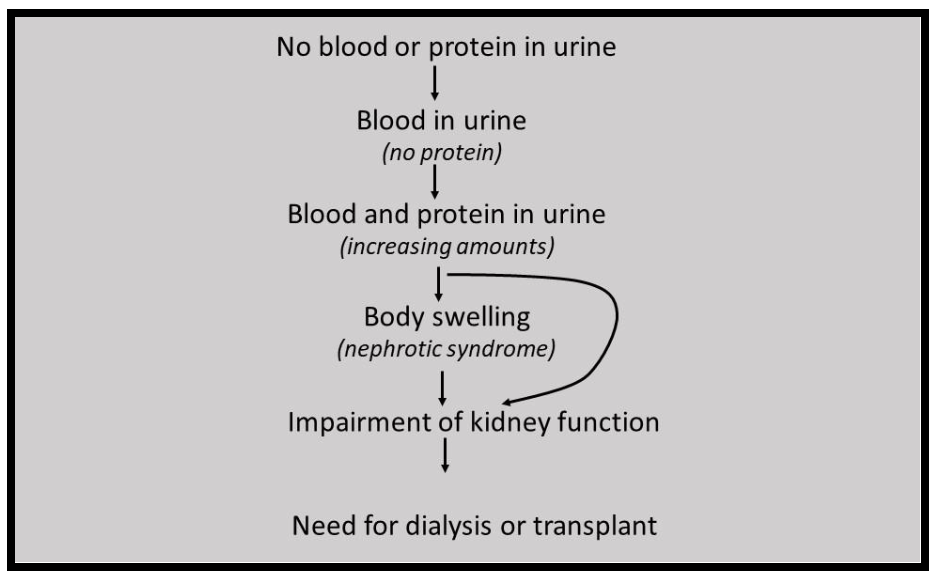Alport syndrome is caused by changes in genes that make different types of collagen (COL4A3, COL4A4, COL4A5). These collagens are involved in the functions of many organs, namely kidneys, inner ears and eyes. It is one of the commonest genetic cause of glomerular disease among adults and children in Asian countries.
There are three kinds of Alport syndrome, depending on the type of genes involved.
| Types of Alport syndrome | Gene(s) involved |
| Sex-linked Alport syndrome | COL4A5 |
| Autosomal recessive Alport syndrome | COL4A3, COL4A4 |
| Autosomal dominant Alport syndrome | COL4A3, COL4A4 |
As collagen is important in the functions for kidney glomeruli, eyes and inner ears, individuals with Alport syndrome can develop kidney (glomerular) disease, hearing loss and abnormalities of the eyes .
Kidney disease in Alport syndrome
Kidney involvement in Alport syndrome often involves a progression through different stages, starting from mild and progressing to severe disease.

The rate of progression differs greatly and depends on many factors such as the type of gene defect, gender and other contributing factors like co-existing high blood pressure and diabetes.
Males with sex-linked Alport syndrome tends to have manifestations at a younger age, and have more severe involvement, compared to females. Individuals with autosomal recessive Alport syndrome tend to progress earlier and more severe manifestations compared to autosomal dominant Alport syndrome.
The likelihood of developing kidney failure (requiring dialysis or kidney transplant) in Alport syndrome are shown in this table:
| Type of Alport syndrome | Likelihood of developing kidney failure
(without treatment) |
| Sex-linked Alport syndrome | Males:
60% by 30 years old 90% by 40 years old 100% by 60 years old |
| Females:
12% by 40 years old 30% by 60 years old 40% by 80 years old |
|
| Autosomal recessive Alport syndrome | 30% by 40 years old |
| Autosomal dominant Alport syndrome | 28% by 56 years old |
How can early diagnosis with genetic testing help?
Treatment
When there is protein in the urine, the use of drugs to decrease urine protein can be helpful. In males with sex-linked Alport syndrome, such drugs may delay kidney failure by more than 15 years. If such drugs are introduced in earlier stages, it is possible that kidney failure may be delayed by even longer. Drugs that suppress the immune system are generally avoided if the diagnosis of Alport syndrome is confirmed.
Hearing loss associated with Alport syndrome
Individuals with Alport syndrome can develop progressive hearing loss. This is dependent on the genetic defect. Not all genetic defects lead to hearing loss.
The hearing loss is typically progressive in nature, starting as mild and progressing to severe disease. In early stages, it affects only the high frequency sounds and may not be noticeable. At later stages, the hearing loss involves the other frequencies and are more severe. The progression of hearing loss is generally on par with the progression of the kidney disease.
| Type of Alport syndrome | Likelihood of hearing loss |
| Sex-linked Alport syndrome | Males:
50% by age 15 years 75% by age 20 years 80-90% by age 40 years Females: ~40%, later in life |
| Autosomal recessive Alport syndrome | Late childhood or early adolescence |
| Autosomal dominant Alport syndrome | Rare, usually as older adults |
There is no treatment that can delay the hearing loss. Protection from loud noises may help. Avoidance of drugs that may affect hearing is recommended. Regular hearing tests are important to allow early detection and interventions. At the later stages, hearing aids will be required.
Eye conditions associated with Alport syndrome
Individuals with Alport syndrome may develop abnormalities in the eyes, commonly affecting the cornea (front of the eye) and the retina (back of the eye).
Anterior lenticonus is a condition in which the cornea of the eyes bulge out. This can result in the need for glasses. Anterior lenticonus occurs in about 20% of males with sex-linked Alport syndrome, and often becomes obvious by late adolescence or early adulthood.
The other common eye abnormality is fleck retinopathy in which yellow or white flecks develop on the retina.
Individuals with sex-linked or autosomal recessive Alport syndrome are more likely to have eye abnormalities while these are uncommon in autosomal dominant Alport syndrome. These eye changes generally do not affect vision.
Where can you find more information about Alport syndrome?
You can refer to the Alport Syndrome Foundation (https://alportsyndrome.org/) for more information and support.


